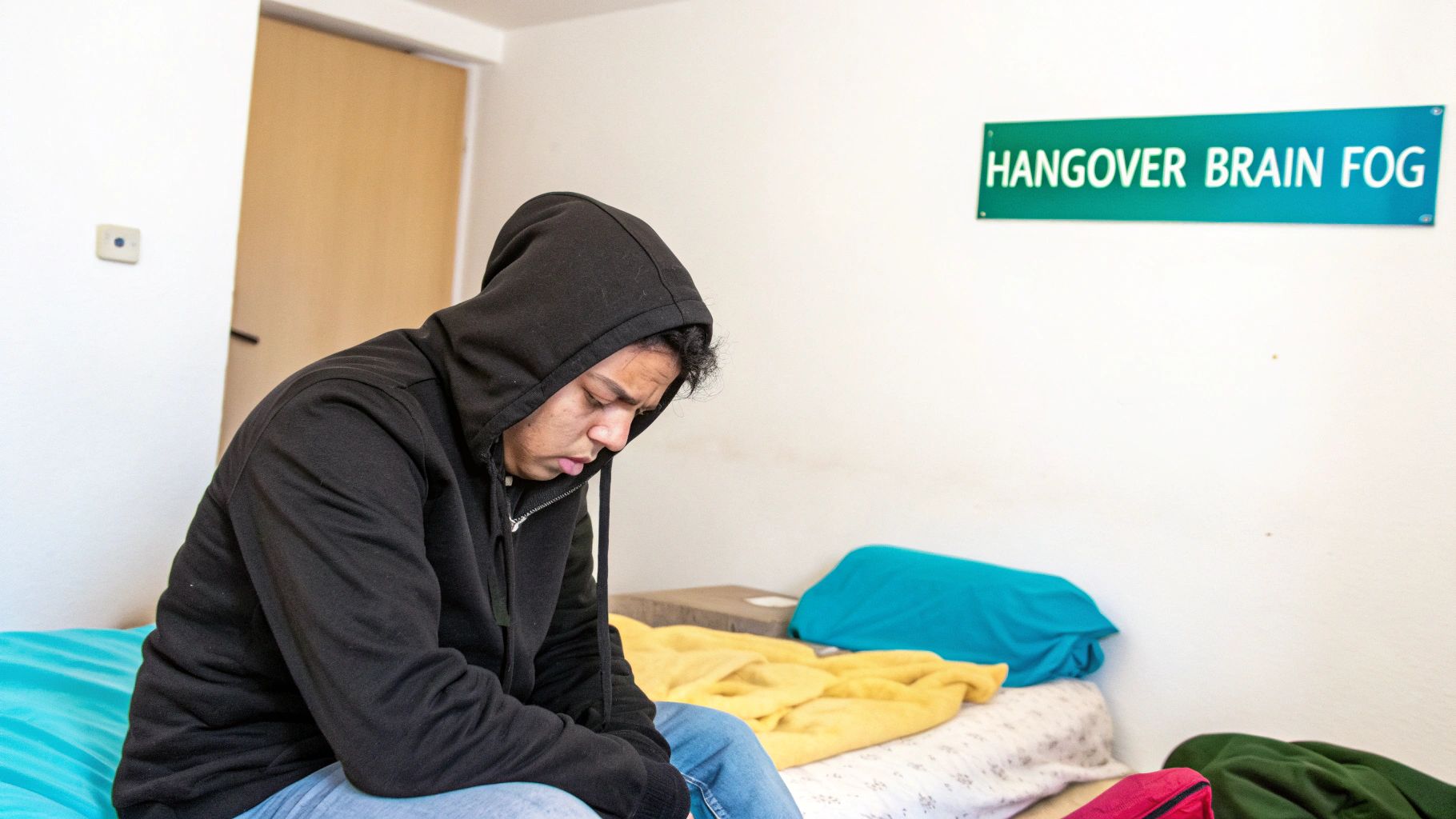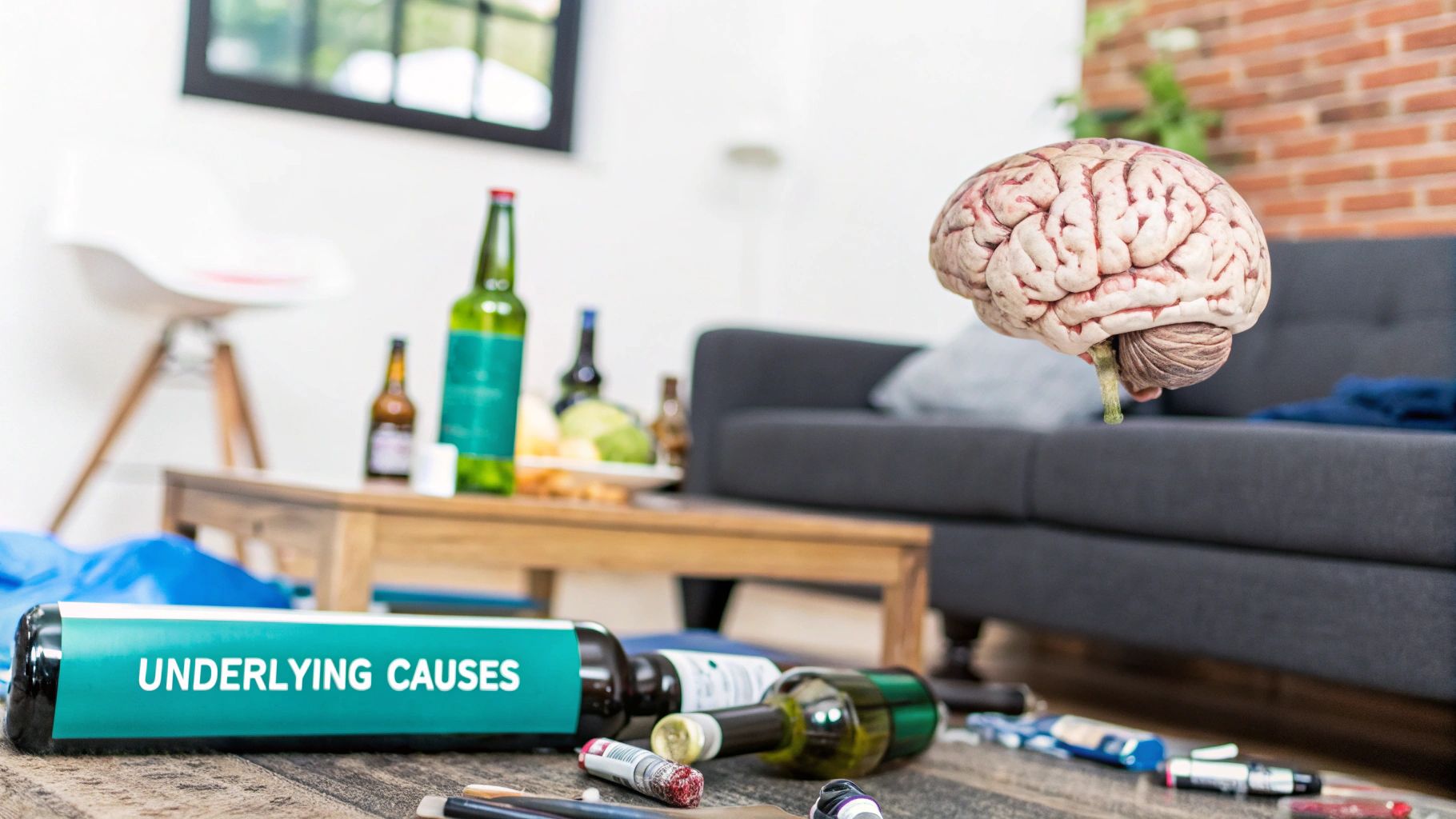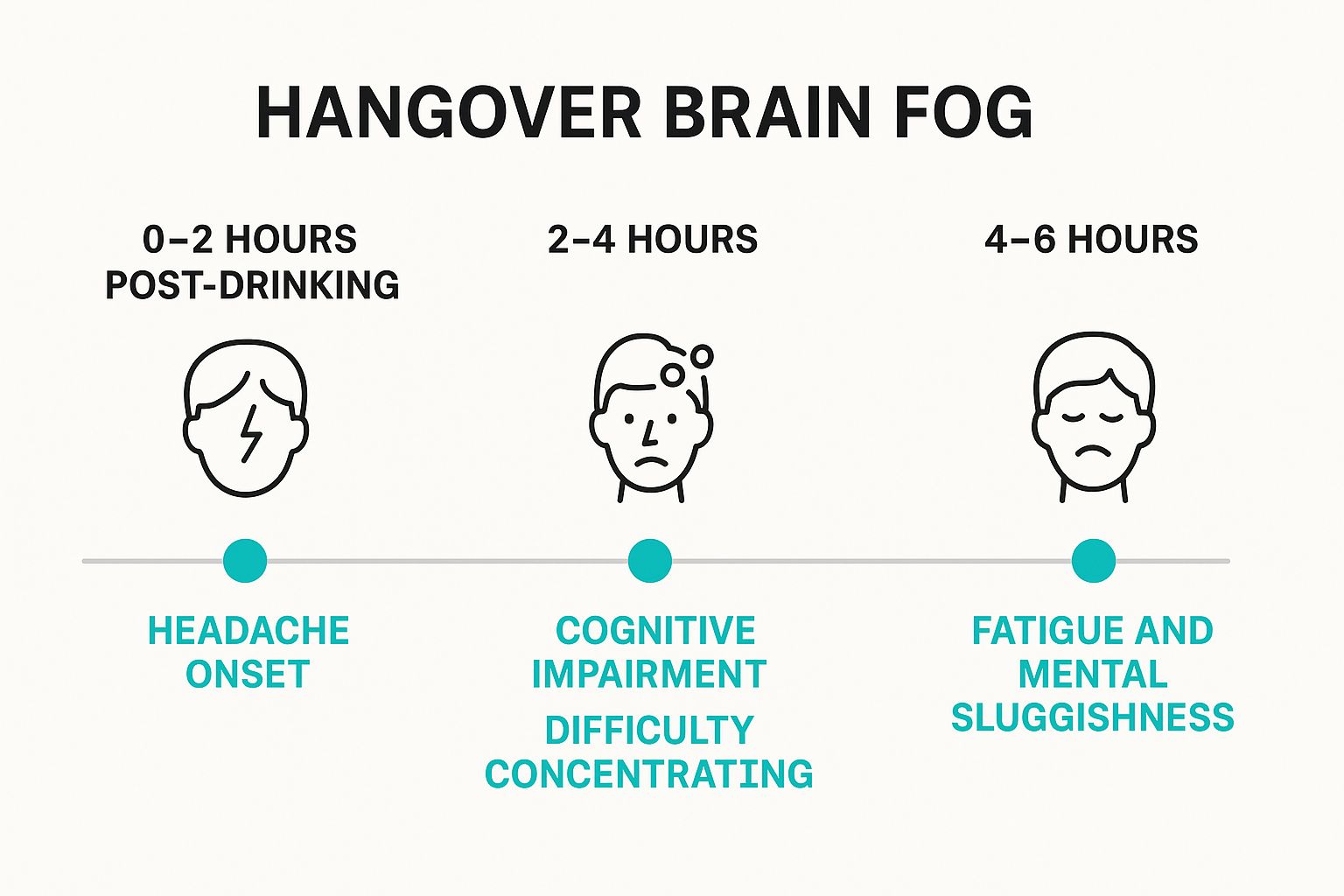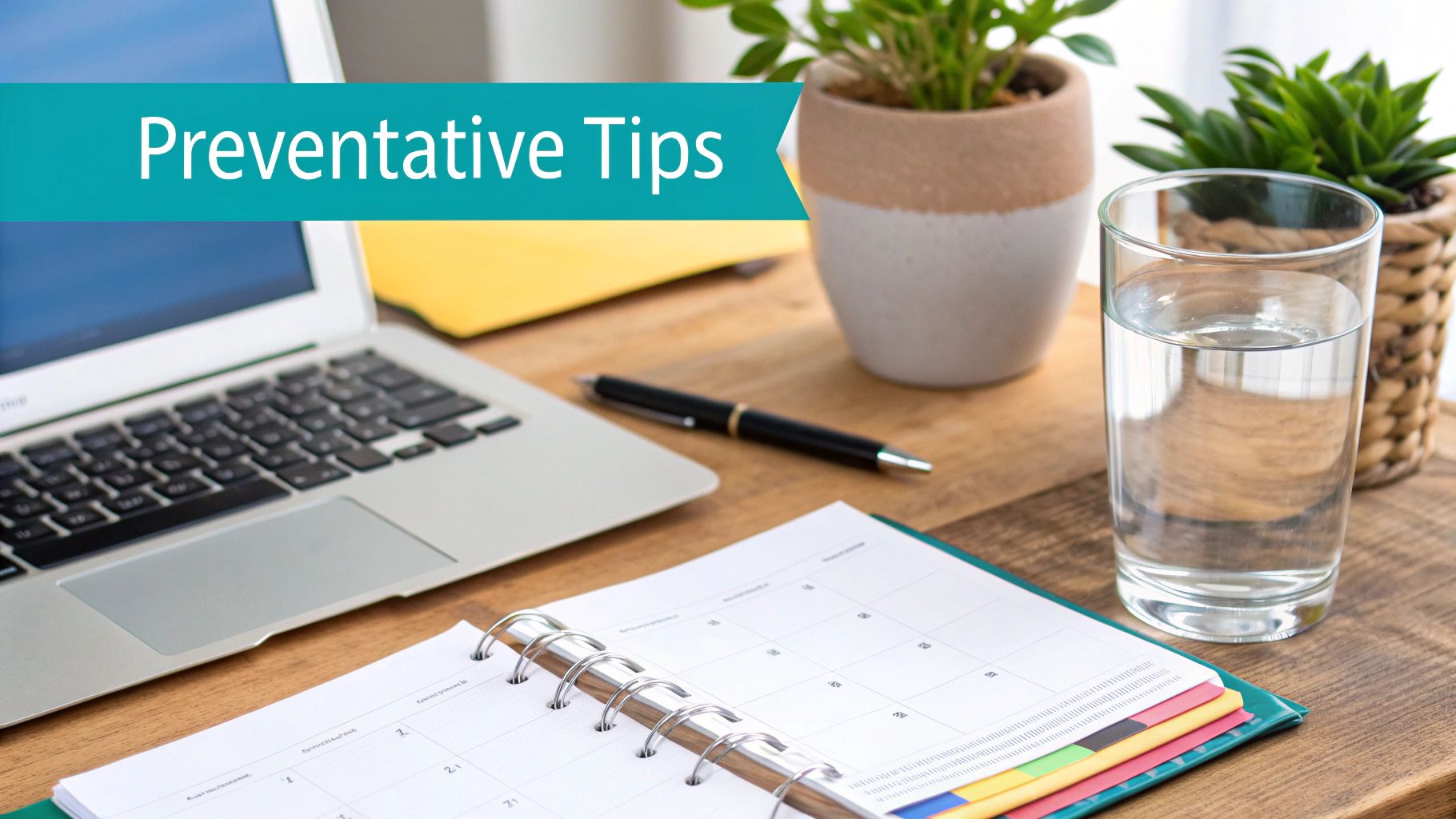

· By Annemarie
Alleviate Hangover Brain Fog Quickly: Expert Tips
Why Your Brain Feels Like Mush After Drinking

That fuzzy, cotton-wrapped feeling after a night out? Yeah, we’ve all been there. It's not just you; it's hangover brain fog, and it's a real thing. It’s that mental sludge that makes thinking, focusing, or even remembering simple things feel like a Herculean effort. I remember one morning after a friend's wedding where I completely blanked on where I parked – talk about a rough start to the day! But it’s more than just a temporary inconvenience; there’s some serious neurological stuff happening behind the scenes.
One of the biggest culprits? Dehydration. Alcohol is a diuretic, meaning it makes you pee… a lot. This flushes essential fluids and electrolytes right out of your system. Your brain, which is about 73% water, needs these fluids to function properly. Think of it like trying to run a car with no oil. It's just not going to work. Ever tried to remember a complicated set of instructions after a night of drinking? Yeah, good luck with that. If you’re curious to learn more about the science behind hangovers, check out this article: What Causes Hangovers.
Beyond dehydration, alcohol messes with your neurotransmitters, the chemical messengers in your brain. At first, it boosts dopamine (the feel-good chemical), which explains the initial euphoria. But this surge is followed by a dramatic drop, leaving you feeling mentally drained and sluggish the next day. It’s like a sugar rush and crash, but for your brain. This imbalance contributes significantly to that foggy feeling. And it’s not just a few people; studies suggest up to 75% of people who drink experience hangovers, with 30–50% reporting brain fog symptoms like trouble focusing, memory lapses, and confusion. Want to dive deeper into hangover brain fog? Discover more insights on hangover brain fog.
Finally, alcohol can trigger inflammation in the brain. This inflammatory response adds another layer to the cognitive slowdown you experience during a hangover. It’s like your brain is nursing a mild injury, making it harder to operate at full capacity. So that groggy, foggy feeling? It's a trifecta of dehydration, neurotransmitter disruption, and inflammation – a triple threat that leaves your brain feeling like mush.
To help you understand where you fall on the spectrum of hangover brain fog, I've put together a handy little table:
To help you gauge your experience, here’s a breakdown of brain fog severity:
| Severity Level | Symptoms | Duration | Recovery Actions |
|---|---|---|---|
| Mild | Slight headache, mild difficulty focusing | A few hours | Drink water, eat a light snack, rest |
| Moderate | Headache, difficulty concentrating, fatigue | Several hours | Hydrate, eat a balanced meal, rest, over-the-counter pain relievers |
| Severe | Severe headache, inability to concentrate, nausea, dizziness | Up to 24 hours | Rest, hydrate, avoid alcohol and caffeine, seek medical advice if needed |
This table gives you a general idea of how hangover brain fog can manifest, from a mild inconvenience to a more serious disruption. Remember, everyone experiences hangovers differently. Listen to your body and take the necessary steps to recover.
What Actually Works When Your Brain Won't Boot Up

This Wikipedia screenshot perfectly captures the misery of a hangover, especially that awful brain fog. Cognitive impairment is right there at the top of the list, messing with your focus and decision-making. Been there.
So, ditch the "hair of the dog" myth and other questionable hangover "cures." Let's talk about what really works when your brain feels like it's swimming in mud. I've talked to experts and plenty of hangover veterans, and here's the real deal.
Yes, drinking water is important, but it's not a magic bullet. Your brain is screaming for electrolytes—those crucial minerals lost when alcohol turns your body into a dehydration machine. We're talking sodium, potassium, and magnesium.
A sports drink or some electrolyte tablets can be lifesavers, replenishing what you've lost and helping your brain get back online. I personally swear by electrolyte tablets after a night out.
Next up: nutrition. Your alcohol-depleted brain needs fuel, specifically B vitamins, especially B1 (thiamine). These are essential for brain function and often take a major hit after drinking.
A balanced meal with whole grains, lean protein, and lots of fruits and vegetables can help restore these vital nutrients. Think of it as giving your brain a tune-up. This isn't an excuse for a greasy breakfast overload – that can actually make things worse by increasing inflammation.
For example, I'll whip up a smoothie with spinach, berries, and protein powder. It's way better than a greasy plate of bacon and eggs, trust me.
Now, let's talk about rest. Your brain needs time to recover from the alcohol-induced rollercoaster it just endured. Trying to fight the fog with caffeine is often a losing battle, leading to more dehydration and anxiety.
Prioritize sleep and some gentle movement, like a light walk or stretching. This gets your blood flowing and helps clear your head. Remember that greasy food we talked about? Yeah, that can mess with your sleep, making the brain fog even worse.
Finally, add antioxidants to your recovery toolkit. Alcohol increases oxidative stress, which contributes to those nasty hangover symptoms. Foods rich in antioxidants, like berries, dark chocolate, and green tea, can help fight back.
Here are some science-backed tips for a faster hangover recovery if you want to dive deeper. These aren't instant fixes, but they're practical steps that can seriously reduce the duration and intensity of that dreaded brain fog, helping you get back to your awesome self.
Your Brain's Recovery Timeline: What To Expect Hour By Hour
Let's be honest, hangover brain fog is the worst. It's not just a general "blah" feeling, it's a real, predictable pattern of misery. But knowing how it usually plays out can make a huge difference in how you handle your recovery. Think of it like a roadmap for getting your brain back online.
The first couple of hours are typically prime headache territory. This is your body's initial freakout from dehydration and the inflammation party that alcohol throws. The next two to four hours are when the real cognitive impairment slams in. Trying to focus on anything remotely challenging is like trying to run through quicksand, and complex tasks? Forget about it. Your brain is officially checked out.
From hours four to six, fatigue and mental sluggishness become the unwelcome houseguests. Even easy decisions feel monumental. I've been there, staring blankly at my closet trying to decide on an outfit, completely overwhelmed.
This infographic illustrates how it all tends to unfold:

See how the early hours are all about physical pain, while the later stages are where the thick cognitive fog rolls in? This pattern is super helpful for anticipating what’s coming and adjusting your plans. Trust me, knowing what to expect is half the battle.
Turning the Corner
Now, while those first six hours are brutal, it’s not all doom and gloom. Most people start to feel a gradual shift after that six-hour mark. This doesn't mean you'll suddenly be firing on all cylinders, but the fog starts to lift, and you can slowly start to think again. But, and this is important, this timeline isn’t universal. These difficulties usually clear up within 12–24 hours for moderate drinkers. But for those who drink heavily or have an alcohol use disorder, brain fog can linger for several days and might come with other withdrawal symptoms. Learn more about how long alcohol-induced brain fog lasts. Everyone's body recovers at its own pace, so getting to know your personal rhythm is key.
By understanding this timeline, you can make smart choices about your day. Should you power through a mild headache and try to get some work done, or is it a total mental rest kind of day? It's all about working with your brain, not against it. Knowing what to expect empowers you to maximize your recovery, not just grit your teeth and bear it.
Prevention Secrets From People Who Actually Know

Let's be honest, the best way to deal with a hangover-induced brain fog is to avoid it in the first place. I've picked up some seriously effective strategies from people who are basically experts in the art of drinking – think bartenders, event planners, and those friends who never seem to miss a party. They’re always sharp the next day, and they've been generous enough to share their wisdom. Trust me, this isn't your typical "drink lots of water" advice.
Pre-Game Nutrition: Fueling Your Brain's Defenses
Skip the greasy pre-party burger. Seriously, what you eat before you drink makes a huge difference in how your brain handles the alcohol. Focus on complex carbohydrates like brown rice and whole grains for sustained energy. Also, don't forget lean protein like chicken or fish. These provide the nutrients your brain needs to function optimally, even when alcohol is in the mix.
For me, a pre-going-out meal might be a salmon salad with quinoa. It's light, satisfying, and gives me that long-lasting energy I need. It’s all about giving your brain the tools to combat the dehydrating effects of alcohol and minimize that dreaded brain fog.
Hydration: Timing is Everything
Alternating alcoholic drinks with water? That’s a good start, but it's not the whole picture. Strategic hydration is the key. Start hydrating hours before your first drink, and keep sipping water consistently throughout the evening. This creates a buffer against dehydration, a major culprit in hangover brain fog.
Consider adding electrolyte drinks or tablets to the mix, too. Alcohol depletes essential minerals, and these drinks help replenish them. These minerals are vital for your brain to function at its best.
Strategic Choices for Social Success
You can be social and avoid brain fog. It’s all about making smart choices. Opt for clear spirits like gin or vodka. They have fewer congeners, which are impurities that can intensify hangovers. Pace yourself, savor each drink, and steer clear of sugary mixers. These can lead to blood sugar crashes that worsen the fog. This way, you can enjoy the night without waking up feeling fuzzy-headed. Looking for more practical tips? We've got you covered: Top Hangover Prevention Tips.
Real-World Scenarios: Adapting Your Strategy
Every social situation is different, so flexibility is important. If it’s a work happy hour, I stick to one or two drinks, prioritize hydration, and avoid sugary cocktails. On weekends, I might be a bit more relaxed, but I still focus on healthy food choices and regular water breaks. Having a plan for different scenarios helps me maintain both my social life and my mental clarity.
To help illustrate these strategies, let's look at a comparison of their effectiveness:
Here's a table summarizing the effectiveness of different hangover prevention strategies:
Prevention Strategy Effectiveness Comparison
Evidence-based comparison of different hangover prevention methods and their effectiveness for brain fog
| Strategy | Effectiveness Rating | Ease of Implementation | Scientific Support |
|---|---|---|---|
| Pre-Game Nutrition (Complex Carbs & Lean Protein) | High | Medium | Strong |
| Consistent Hydration | High | Easy | Strong |
| Choosing Clear Spirits | Medium | Easy | Moderate |
| Avoiding Sugary Mixers | Medium | Easy | Moderate |
| Pacing Yourself | Medium | Medium | Moderate |
| Electrolyte Supplements | Medium | Easy | Moderate |
As you can see, combining strategies like pre-game nutrition and hydration offers the best defense against brain fog. While choosing clear spirits and avoiding sugary mixers can help, they are less impactful than a solid nutritional and hydration plan. Remember, the goal is to enjoy yourself while minimizing the negative consequences, and a multi-pronged approach is the most effective way to achieve that.
When Brain Fog Signals Something Bigger
We’ve all been there. That hazy, can’t-quite-think-straight feeling after a night out. That's your standard hangover brain fog. Usually, it’s gone within 24 hours and you’re back to your sharp self. But what if it lingers? What if the mental cobwebs just won’t clear? That’s when we need to talk about the difference between a typical hangover and a potential alcohol-related brain problem.
Recognizing the Red Flags
So, how can you tell if your brain fog is more than just a hangover? The biggest clue is duration. If the fuzziness sticks around for days, or even weeks, after you’ve stopped drinking, that’s a definite red flag. Pay attention to the severity, too. Are simple tasks suddenly difficult? Are you forgetting appointments or struggling to focus? These could be signs that alcohol is having a deeper impact on your cognitive function.
I remember going through a phase where my memory was noticeably worse after even just a couple of drinks. It really made me rethink my relationship with alcohol. Also, think about the frequency. If you notice these symptoms cropping up more often, even with less alcohol, it's a good idea to dig a little deeper.
The Bigger Picture: Alcohol’s Long-Term Impact
We all know alcohol affects us in the short term, but it's easy to forget about the long-term consequences. Consistent heavy drinking can actually cause structural changes in the brain, affecting your memory, decision-making skills, and other cognitive functions. It's a serious thing to consider.
Alcohol can also mess with your sleep, deplete important nutrients, and make any underlying mental health conditions worse. All of these can contribute to that lingering brain fog. Thinking beyond personal experiences, the wider societal impact is important. Data from the WHO and other health organizations shows that while the percentage of adults struggling with harmful alcohol use is relatively steady at about 5–7%, the actual number of people affected is growing simply because the global population is increasing. Discover more insights on alcohol and depersonalization.
Seeking Support and Taking Action
If you’re worried about your cognitive health, please talk to a doctor. They can help you figure out what’s going on and point you towards the right resources. Asking for help isn’t something to be ashamed of; it shows you’re taking care of yourself. Talking to my doctor was a game-changer for me – getting a professional perspective was incredibly valuable.
There are also tons of support groups and online communities out there where you can connect with others who understand what you’re going through. You’re definitely not alone in this. Taking charge of your health and addressing any potential alcohol-related cognitive issues is a powerful step. It gives you the knowledge and control to make the best choices for your future well-being.
Building A Brain That Bounces Back Faster
Beyond just dealing with individual hangovers, it's about building a brain that recovers faster and stronger. Think of it like training for a marathon; you're not just running one race, you're building endurance and resilience for the long haul. So, how do we build this cognitive resilience when it comes to alcohol? It's a mix of smart lifestyle choices, good nutrition, and understanding how our brains work.
Lifestyle Tweaks That Make a Real Difference
Let's talk sleep. I know, it sounds obvious, but good sleep is crucial for brain recovery. Alcohol messes with your sleep cycles, even if you get enough hours. It's like charging your phone with a faulty cable – you see it plugged in, but it's not getting the juice it needs. Prioritize consistent sleep and a relaxing bedtime routine. A hot bath with Epsom salts and some calming music does the trick for me.
Stress management is another biggie. Stress, like alcohol, is hard on your brain. Combining the two is like adding fuel to the fire. Find healthy ways to manage stress, whether it's yoga, meditation, or just spending time outdoors. Even a short walk in the park can be a game-changer. When your stress is under control, your brain is much better equipped to handle the after-effects of alcohol.
Nutrition: Fueling Your Brain’s Recovery
You already know about hydration and electrolytes. But beyond that, think about adding brain-boosting nutrients to your daily routine. B vitamins are vital for cognitive function and they often take a hit after drinking. I’ve added a B-complex supplement to my morning routine.
Omega-3 fatty acids, found in fish oil and flaxseed, are also great for brain health. They're like giving your brain a protective layer, helping it withstand the effects of alcohol. I sprinkle flaxseed on my oatmeal and try to eat fatty fish like salmon a couple of times a week.
Learning From the Pros
I've picked up a lot from talking to people who've successfully balanced social drinking with keeping their brains sharp. Many emphasize mindfulness when it comes to alcohol. It's not about abstaining, it's about making conscious choices. For example, instead of mindlessly downing drinks at a party, they savor each one, checking in with how they're feeling.
They also prioritize long-term brain health over short-term fun. This means regular exercise, a balanced diet, and enough sleep, whether they've been drinking or not. They see these healthy habits as investments in their cognitive resilience. These aren’t quick fixes, they're long-term strategies that pay off every time you have a drink.
Your Personal Hangover Brain Fog Game Plan
Okay, so let's chat about crafting your own personal hangover brain fog strategy. This isn't a one-size-fits-all kind of thing. It's all about discovering what truly works for your body and how you live. Trust me, I've had enough foggy mornings to know a personalized approach is the only way to go.
Creating Your Prevention Checklist
First up: prevention. Remember those pre-game tips we talked about? Let's turn those into a personalized checklist. Think about what kind of pre-drinking meal really works for you. Are you an electrolyte drink person, or do you prefer tablets? Having a solid plan makes it so much easier to stick to it when you're out and about. I personally find having a checklist on my phone is a total game-changer.
Building Your Recovery Protocol
Next, let's build your recovery protocol. What helps your brain bounce back after a night out? A B-complex supplement? Maybe a green smoothie? Or even a long walk in the park? Figure out what gives you the most relief and make it your go-to routine. For me, it's electrolyte tablets and a huge glass of water first thing in the morning – I swear by it.
Decision-Making Frameworks: Navigating Different Drinking Situations
Let’s be honest, not all drinking occasions are created equal. A work happy hour calls for a totally different strategy than a weekend celebration with friends. So, it's helpful to develop some decision-making frameworks for different situations. How many drinks will you have at a work event? What strategies will you use to pace yourself at a wedding? Having these guidelines in place helps you make smart choices in the moment. At work events, for example, I stick to a two-drink maximum and always have a glass of water between each drink.
Tracking, Goals, and Troubleshooting
Finally, track your progress. What interventions really reduce your brain fog? What challenges are you facing? Keeping a simple journal can be incredibly insightful. Set some realistic goals for yourself. Maybe you're aiming to cut your brain fog episodes in half, or perhaps you're focusing on better sleep after drinking. Tracking your progress shows you what's working and what's not.
And hey, setbacks happen. It's totally normal. Have a troubleshooting plan in place. What will you do if you miss your hydration goals? How will you get back on track after a particularly rough morning? Having a plan B makes it easier to bounce back and keep moving toward clearer, brighter mornings.
A little planning really does go a long way. By creating your own personalized game plan, you're taking control of your hangover brain fog and making sure you can enjoy social occasions without sacrificing your mental sharpness. Want to boost your recovery? Check out Upside Hangover Sticks https://enjoyupside.com. These convenient, on-the-go jelly sticks are packed with natural ingredients to help you feel your best after a night out.
